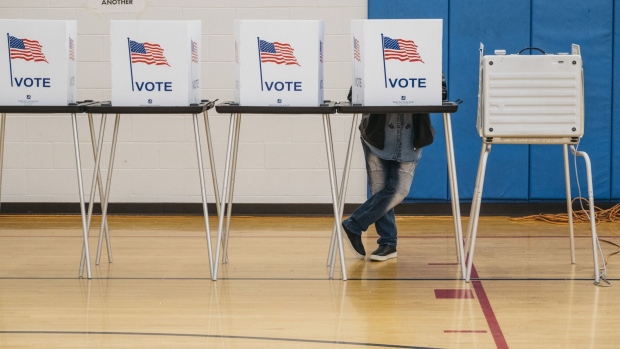Nov 14, 2023
Trump Wins Michigan Ruling to Remain on Primary Ballot
, Bloomberg News

(Bloomberg) -- A judge in Michigan rejected an effort to keep Donald Trump off ballots in the state’s 2024 Republican presidential primary, but declined to rule on his inclusion for the general election.
Michigan Court of Claims Judge James Robert Redford said it’s premature to decide whether a constitutional ban on insurrectionists holding public office could come into play in the November contest, but signaled he believes it’s a “political” question that Congress, and not the courts, should decide.
The decision is the latest in recent weeks to rebuff efforts to invoke the US Constitution to stymie Trump’s latest presidential run. The Minnesota Supreme Court last week dismissed a similar case involving primary ballots in that state.
In the Michigan case, Redford found that under state law, political parties decide who to submit as their candidates for a primary election and the state’s top election official doesn’t have authority to intervene and block someone from appearing on constitutional grounds.
Read More: Trump Ballot Challenge Tossed by Minnesota Court for Primary
Lawyers involved in bringing the Michigan case against Trump said that they would appeal Redford’s decision and ask to take the fight directly to the Michigan Supreme Court. They said Redford’s ruling relied on a “discredited theory” about the role of Congress versus the courts to decide if a candidate was disqualified under the insurrectionist ban.
“The Michigan Supreme Court should reverse this badly-reasoned lower court decision,” Ron Fein, legal director of advocacy group Free Speech for People, said in the statement. “While our appeal is pending, the trial court’s decision isn’t binding on any other court, and we continue our current and planned legal actions in other states to enforce Section 3 of the 14th Amendment against Donald Trump.”
Free Speech for People is also involved in the Minnesota case.
Trump campaign spokesperson Steven Cheung said in a statement that the ballot contests are “un-Constitutional left-wing fantasies” and that the campaign “welcomes these dismissals in Michigan and anticipates the future dismissals of the other 14th Amendment cases.”
Michigan is the most competitive of the states where Trump opponents were trying to keep him off the ballot. A Bloomberg News/Morning Consult poll this month found that the race in Michigan was a dead tie, with Trump and President Joe Biden both at 43%.
The Michigan and Minnesota cases are among dozens filed in courts across the country this year seeking to disqualify Trump from another term in the White House under Section 3 of the 14th Amendment. The post-Civil War era provision states that a person who took an oath to support the Constitution and then “engaged in insurrection” is ineligible to hold office again.
The challenges are all arguing that Trump’s role in trying to overturn the results of the 2020 presidential election leading up to the Jan. 6, 2021, attack on the US Capitol should disqualify him from being president again.
A state judge in Colorado is poised to rule soon in another 14th Amendment case. That ballot contest against Trump moved forward to a full trial with witnesses after the judge denied Trump’s early effort to get it dismissed.
Whether the constitutional challenge to Trump’s latest presidential run is a “political question” that courts lack authority to decide is a key issue across these cases. The Minnesota Supreme Court didn’t address that issue in its decision tossing out the case for the primary election. In Colorado, the judge disagreed with Trump on the “political question” but said she’d potentially revisit it after hearing evidence and arguments during the trial earlier this month.
Some attorneys in these cases have speculated that the fight will eventually need to be resolved by the US Supreme Court. During arguments before the Minnesota Supreme Court earlier this month, one of the justices expressed concern about the potential for “chaos” if some states kept Trump off of ballots while others allowed him on.
Redford raised a similar fear in Tuesday’s decision, writing that the issues at stake were “by their nature political” and that the dozens of cases “present the risk of completely opposite and potentially confusing opinions and outcomes.”
--With assistance from Gregory Korte.
(Updates with comment from Trump campaign spokesperson and additional information from ruling. An earlier version corrected the judge’s first name.)
©2023 Bloomberg L.P.








